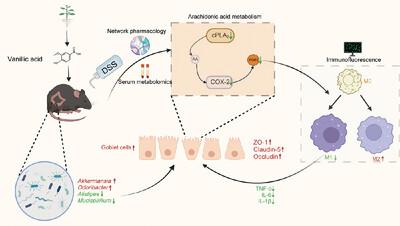Therapeutic Potential of Vanillic Acid in Ulcerative Colitis Through Microbiota and Macrophage Modulation
IF 4.5
2区 农林科学
Q1 FOOD SCIENCE & TECHNOLOGY
引用次数: 0
Abstract
This study investigated the protective effects of the dietary polyphenol vanillic acid (VA) on dextran sulfate sodium-induced acute ulcerative colitis (UC) in mice, focusing on its impact on the gut microbiota and inflammatory responses. VA was supplemented following dextran sulfate sodium administration, and key indicators, including body weight, disease activity index, colon length, spleen index, and inflammatory markers, were assessed. VA supplementation significantly alleviated UC symptoms, preserved intestinal barrier integrity, and reduced pro-inflammatory cytokine levels. Additionally, VA positively altered the gut microbiota composition, promoting beneficial bacteria such as Akkermansia muciniphila while suppressing the arachidonic acid metabolism pathway. Fecal microbiota transplantation confirmed that the VA-modified gut microbiota contributed to these protective effects. VA also facilitated macrophage polarization from the pro-inflammatory M1 phenotype to the anti-inflammatory M2 phenotype, further mitigating inflammation. These findings highlight the potential of VA as a natural dietary intervention for UC, emphasizing its role in regulating the gut microbiota and inflammatory pathways, which may have significant nutritional relevance in managing inflammatory bowel diseases.

香草酸通过菌群和巨噬细胞调节治疗溃疡性结肠炎的潜力
本研究探讨了日粮多酚香草酸(VA)对小鼠葡聚糖硫酸钠诱导的急性溃疡性结肠炎(UC)的保护作用,重点研究了其对肠道菌群和炎症反应的影响。给予葡聚糖硫酸钠后补充VA,并评估关键指标,包括体重、疾病活动指数、结肠长度、脾脏指数和炎症标志物。补充VA可显著缓解UC症状,保持肠道屏障完整性,降低促炎细胞因子水平。此外,VA积极改变肠道菌群组成,促进有益菌,如嗜muciniphila,同时抑制花生四烯酸代谢途径。粪便微生物群移植证实了va修饰的肠道微生物群有助于这些保护作用。VA还促进巨噬细胞从促炎M1表型向抗炎M2表型极化,进一步减轻炎症。这些发现强调了VA作为UC的天然饮食干预的潜力,强调了其在调节肠道微生物群和炎症途径中的作用,这可能在治疗炎症性肠病中具有重要的营养相关性。
本文章由计算机程序翻译,如有差异,请以英文原文为准。
求助全文
约1分钟内获得全文
求助全文
来源期刊

Molecular Nutrition & Food Research
工程技术-食品科技
CiteScore
8.70
自引率
1.90%
发文量
250
审稿时长
1.7 months
期刊介绍:
Molecular Nutrition & Food Research is a primary research journal devoted to health, safety and all aspects of molecular nutrition such as nutritional biochemistry, nutrigenomics and metabolomics aiming to link the information arising from related disciplines:
Bioactivity: Nutritional and medical effects of food constituents including bioavailability and kinetics.
Immunology: Understanding the interactions of food and the immune system.
Microbiology: Food spoilage, food pathogens, chemical and physical approaches of fermented foods and novel microbial processes.
Chemistry: Isolation and analysis of bioactive food ingredients while considering environmental aspects.
 求助内容:
求助内容: 应助结果提醒方式:
应助结果提醒方式:


